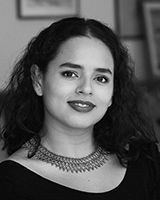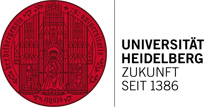“Heidelberg Is a Wonderful Place to Live”

Isabela Paredes Cisneros, Medical Physicist, Doctoral Researcher at the German Cancer Research Center (DKFZ)
Studied at Heidelberg University and DKFZ from September 2017 until March 2018 as a part of the international master program Clinical Medical Physics, doctoral researcher at DKFZ and Heidelberg University since October 2018
What connection do you have to Heidelberg University/DKFZ - when, how long and in what position have you stayed there?
I started a double-degree master program in Chile in March of 2016 with the Pontificia Universidad Católica de Chile in Santiago and Heidelberg University, through the Heidelberg Center Latin America. The DKFZ was also a part of the program and thanks to a DAAD scholarship, I came to Heidelberg for the first time to finish the master program and to develop my master thesis at the DKFZ for a total of seven months. During this time I applied for the International PhD Program at the DKFZ and I got a PhD position! I came back to Heidelberg to start my PhD, so currently I am a Doctoral Researcher at the DKFZ and I am enrolled at the Physics Faculty in Heidelberg University since October of 2018.
When did you arrive in Heidelberg? How long do you plan to stay? What are your goals for your time in Heidelberg?
My first stay in Heidelberg was from September of 2017 until March of 2018, during my master. Then I came back in August of 2018, so I have been here for a year and a half now. I still have around two more years to finish my PhD but I would love to stay in Heidelberg afterwards. I have definitely lost my heart in this lovely town. At the moment I focus mainly in my PhD project, along with some personal goals. I can imagine myself continuing with my academic career here, maybe with a PostDoc position, but that is dependent on the opportunities available at the end of the PhD. I try to stay in the moment and not worry about that right now.
Why did you decide in favour of the Ruperto Carola?
During my undergraduate studies back in Bogotá, I remember always wanting to study in Germany. That opportunity came with the double-degree master, which would take me first to Chile. Back then I was not aware of the prestige of Heidelberg University, so in that matter it was more luck than choice what got me to study in this university. I am very grateful for that now.
What have you learned so far in Heidelberg? What experiences have been particularly valuable?
I think there are so many things, they would not fit in this interview. During the past year, I have grown as a person, more than I could ever imagined. The beginning of my PhD was particularly challenging, with a new environment, a new project, and many expectations piled up over many years. It was then when I realized that there is nothing more important than health. Physical and mental health. Learning to take care of myself, in every aspect, has been the most valuable experience yet. I even started training Krav Maga – an Israeli self-defense technique – which I enjoy very much! I have also learnt many lessons from all the people I have meet, with different background than me. I have drastically improved my cooking and cleaning skills. Now I am spoiled with the short distances in Heidelberg, and the easier life of a small town (in comparison to Bogotá and Santiago).
What do you like best about being in Heidelberg? What suggestions would you have for improvements?
Heidelberg is a wonderful place to live. I love riding my bike, walking through the old town, hearing many languages everywhere, working at the DKFZ, having an airport close so I can “escape” when necessary… One of the challenging things about the city though is what I perceive as increasing prices. Flat rent and food prices are high in comparison with other cities in Germany. I do not know if there is an immediate solution for it. Maybe a higher offer of flats for students would be a starting point.
What is your view of the German scientific system in comparison to that of your home country or to that of other countries where you may have conducted research?
The main difference is that Germany has a larger budget for research, in comparison to Colombia or Chile. Therefore, everything runs more smoothly and efficiently. A side effect of that is the increased amount of qualified people trying to get a position in academia. I would have better chances to do so in Latin America than in Germany. Overall, I would say in all places research is conducted with a lot of passion, making use of all available resources.
In your opinion, what is the importance of international exchanges for researchers?
Exchange in general is a very humbling experience. One can go around thinking things are best done in one particular way, and working side by side with people from all over the world brings a lot of perspective. In my particular case, I try to learn from all the people around what I can do better, by comparing with my current knowledge. At the same time, that comparison makes me embrace my own heritage, which I also try to show to those around me.

